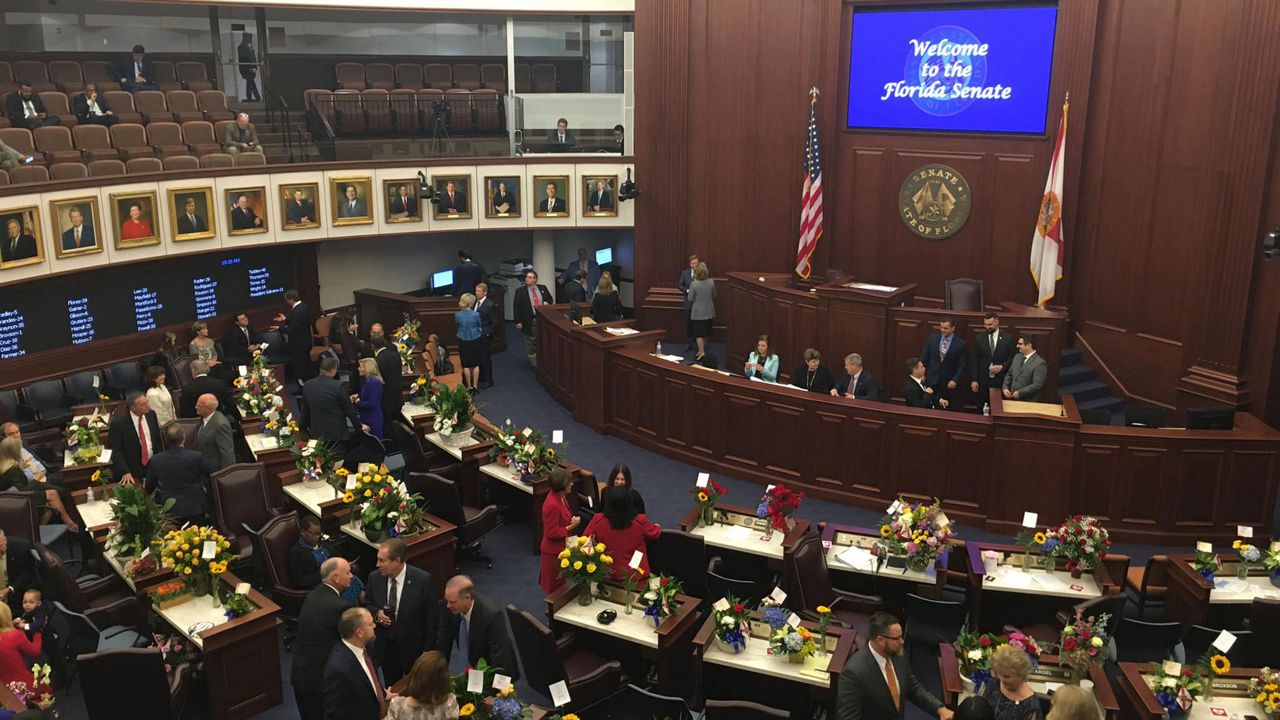STATEWIDE — The Florida Senate on Thursday passed a controversial bill aimed at curbing violent protests in the state by a vote of 23-17.
House Bill 1, known as the Combating Violence, Disorder and Looting and Law Enforcement Protection Act, now heads to Gov. Ron DeSantis' desk for his signature. Passage of the bill was a key legislative priority for DeSantis heading into this year’s legislative session.
What You Need To Know
- The Florida Senate approves bill that imposes penalties during some protests
- The legislation will now be sent to Gov. Ron DeSantis for his signature
- DeSantis says it's needed to protect order and property during protests
- Critics say it would restrict protesters' right to free speech
The measure has become perhaps the most controversial measure before the Florida Legislature this session. It would toughen penalties for crimes that occur during protests that turn violent.
When signed into law, it would allow authorities to hold arrested protesters until a first court appearance. And it would establish new felonies for organizing or participating in a violent demonstration.
Adding to that, city and county governments could be held financially liable for damages if they failed to control protests that get out of hand. It would strip local governments of civil liability protections if they interfere with law enforcement’s efforts to respond to a violent protest and add language to state law that could force local governments to justify a reduction in law enforcement budgets.
The legislation calls for a mandatory 6-month prison sentence for anyone convicted of battery on a law enforcement officer during a protest, and for fines and possibly up to five years behind bars for anyone convicted of causing harm to a law enforcement officer or damaging property.
The proposal would also make it a second-degree felony to destroy or demolish a memorial, plaque, flag, painting, structure or other object that commemorates historical people or events. That would be punishable by up to 10 years in prison.
After the bill's final passage, DeSantis said he looked forward to signing the measure into law.
“This legislation strikes the appropriate balance of safeguarding every Floridian’s constitutional right to peacefully assemble, while ensuring that those who hide behind peaceful protest to cause violence in our communities will be punished,” the governor said in a statement.
The “anti-riot” bill is a response to the several Black Lives Matter protests across Florida last year that turned violent. DeSantis has said the state’s laws need to be strengthened to preserve order and to try to keep protesters from destroying property.
"Rights have limits, and violence is where the line is drawn,” said Republican Sen. Danny Burgess, who represents parts of Pasco, Hillsborough and Polk counties and carried the bill in the Senate. “This bill is about preventing violence.”
State Sen. Ed Hooper, a Republican who represents parts of Pasco and Pinellas counties in District 16, joined the GOP majority in advancing the bill to the governor.
“Can I tell you that this bill is not about racism? Not entirely, I don't know,” Hooper said. “But I do believe in my heart that, at the end of the day, we are a nation and a country of law and order.”
Floridians who have testified against the bill argue that it is a direct attack on free speech. The measure drew intense passions over the months, as community activists from across the state gathered in the state Capitol to implore lawmakers to turn down the effort.
But Democrats saw it differently, saying it was designed to muzzle dissent.
“This is not going to stop people from rising up," said Sen. Darryl Rouson (D-District 19), a former St. Petersburg chapter president of the NAACP.
“This won't stop anything, except those who are afraid. I'm not afraid," he said. “I just want to say to people, keep on knocking, keep on protesting, keep on rising in spite of an attempt to stifle voices."
Democrat Janet Cruz of the Tampa Bay area expressed disappointment after the vote.
I’m disappointed and I’m particularly hurting for our minority communities, as the Senate has passed HB 1 today.
— Janet Cruz (@SenJanetCruz) April 15, 2021
Protest is the voice of the neglected, of the unheard, and of the oppressed. #HB1 depreciates the importance of our most sacred right, the First Amendment. https://t.co/y4DIGROeIY
Katya Guillaume of Spectrum News and The Associated Press contributed to this report.



